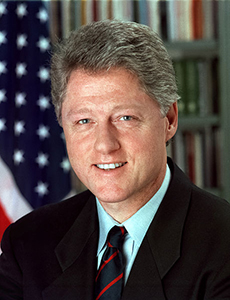In the 1992 presidential election, the United States voters actually had three choices: Republican (and current president) George H.W. Bush, Democrat William Jefferson Clinton, and Independent candidate Ross Perot, a billionaire from Texas.
 Bill Clinton ended George H.W. Bush's chances for re-election. |
Bill Clinton was born in Arkansas in 1946, and he served as the state's governor for more than 10 years. From 1977 to 1979, he was also the attorney general of Arkansas.
Unlike Bush, Clinton was young and charismatic; at 46 years old, he was the third-youngest president in American history. Clinton had a folksy, lower-class appeal, partly due to his personal history (he came from a poor family), whereas George H.W. Bush had a stiff public persona and had grown up in a wealthy family. These factors, combined with Bush's difficulty reconnecting with voters after breaking his promise not to raise taxes, propelled a Democratic candidate into the White House in 1992 for the first time since 1979.
Question
Why would the presence of a significant third-party candidate (like Ross Perot) have a big effect on the outcome of an election?
While it's not the third-party candidate's responsibility to worry about getting a Republican or Democrat elected, their presence on the ballot does have an effect on the election.
